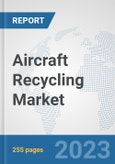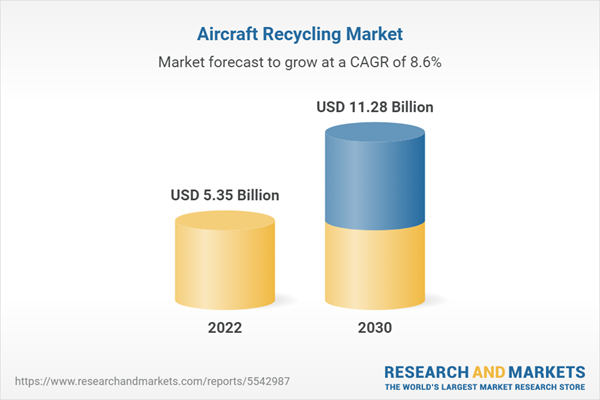Aircraft recycling refers to the systematic process of dismantling, salvaging, and responsibly disposing of aircraft that have reached the end of their operational lives. This includes commercial airliners, cargo planes, military aircraft, and other types of aircraft. Aircraft recycling aims to maximize the recovery of valuable materials, components, and parts from retired aircraft while minimizing environmental impact. The aircraft recycling process involves several stages. First, the aircraft is taken out of active service and transported to a specialized recycling facility. Here, trained professionals assess the aircraft's condition and create a detailed inventory of its components. Next, the aircraft undergoes dismantling, where various materials such as aluminum, titanium, steel, and composites are carefully removed. These materials are then sorted, cleaned, and prepared for recycling or resale. In addition to recovering materials, aircraft recycling often includes the retrieval of valuable aircraft parts. These components can be refurbished and sold on the aftermarket, providing cost-effective alternatives for aircraft operators and maintenance providers. The recycling process also includes the safe disposal of hazardous materials, such as chemicals, fuels, and other potentially harmful substances, in compliance with environmental regulations. Aircraft recycling aligns with the principles of sustainability and environmental responsibility. It helps reduce the carbon footprint of the aviation industry by diverting aircraft from landfills and promoting the reuse of materials. Moreover, it supports the concept of the circular economy, where resources are conserved and reused, contributing to a more eco-friendly and resource-efficient aviation sector.
The growth of the aircraft recycling market is significantly driven by the rising number of retired airplanes. As more aircraft reach the end of their operational lives, the demand for recycling services continues to surge. This increased number of retired planes drives the expansion of the aircraft recycling industry. In addition, aircraft recycling is economically beneficial due to the recovery of valuable materials and aircraft parts. The metals recovered from aircraft such as aluminum, titanium, steel, and other composite materials are recyclable. Additionally, many airlines around the world are utilizing recovered aircraft parts. The recovery and potential reuse of these materials contribute to the economic viability of aircraft recycling, thus driving market growth. However, establishing a recycling facility and acquiring the necessary equipment requires significant upfront costs. This requirement of high initial investment may hinder market growth. Nonetheless, the aftermarket for aircraft parts is growing rapidly, which provides lucrative growth opportunities for the aircraft recycling market.
The aircraft recycling market is segmented into North America, Europe, Asia Pacific, and the rest of the world. North America is expected to hold a maximum share of the aircraft recycling market during the projected period. North America has one of the world’s largest and most established aviation industries. This region is home to numerous major airlines, aircraft manufacturers, and Maintenance, Repair, and Overhaul (MRO) facilities. Thus, the retirement and decommissioning of aircraft occur frequently, providing a consistent source for aircraft recycling companies. The sheer volume of retired aircraft in North America ensures a steady demand for recycling services. Moreover, the Europe region is anticipated to grab a significant share of the aircraft recycling market due to strict environmental regulations. The continent has been at the forefront of implementing strict environmental regulations and promoting sustainable aviation practices. As a result, aircraft operators and airlines in Europe are compelled to adopt eco-friendly recycling methods, to align with these stringent environmental standards.
Report Findings
1) Drivers
- The increasing number of retired airplanes is driving the growth of the aircraft recycling market.
- Aircraft recycling is economically viable due to the recovery of valuable materials and aircraft parts, which fuels market growth.
2) Restraints
- The requirement of high initial investment may hinder market growth.
3) Opportunities
- The aftermarket for aircraft parts is growing rapidly, which provides lucrative growth opportunities for the aircraft recycling market.
Research Methodology
A) Primary Research
The primary research involves extensive interviews and analysis of the opinions provided by the primary respondents. The primary research starts with identifying and approaching the primary respondents, the primary respondents are approached include1. Key Opinion Leaders
2. Internal and External subject matter experts
3. Professionals and participants from the industry
The primary research respondents typically include
1. Executives working with leading companies in the market under review2. Product/brand/marketing managers
3. CXO level executives
4. Regional/zonal/ country managers
5. Vice President level executives.
B) Secondary Research
Secondary research involves extensive exploring through the secondary sources of information available in both the public domain and paid sources. Each research study is based on over 500 hours of secondary research accompanied by primary research. The information obtained through the secondary sources is validated through the crosscheck on various data sources.The secondary sources of the data typically include
1. Company reports and publications2. Government/institutional publications
3. Trade and associations journals
4. Databases such as WTO, OECD, World Bank, and among others.
5. Websites and publications by research agencies
Segment Covered
The global aircraft recycling market is segmented on the basis of aircraft, product, and material.The Global Aircraft Recycling Market by Aircraft
- Narrow-body
- Wide-body
- Regional
The Global Aircraft Recycling Market by Product
- Engine Components
- Landing Gear
- Avionics
- Others
The Global Aircraft Recycling Market by Material
- Aluminum
- Other Metals & Alloys
Company Profiles
The companies covered in the report include- Aircraft End-of-Life Solutions (AELS)
- TARMAC AEROSAVE
- ecube,inc
- AIR SALVAGE INTERNATIONAL LTD
- Aviation International Recycling
- Vallair
- VIRTUSTRADE RECYCLING AIRPLANES
- ComAv - Commercial Aviation Services
- VAS Aero Services, LLC
- CAVU Aerospace Inc.
What does this Report Deliver?
1. Comprehensive analysis of the global as well as regional markets of the aircraft recycling market.2. Complete coverage of all the segments in the aircraft recycling market to analyze the trends, developments in the global market and forecast of market size up to 2030.
3. Comprehensive analysis of the companies operating in the global aircraft recycling market. The company profile includes analysis of product portfolio, revenue, SWOT analysis and latest developments of the company.
4. Growth Matrix presents an analysis of the product segments and geographies that market players should focus to invest, consolidate, expand and/or diversify.
This product will be delivered within 1-3 business days.
Table of Contents
Companies Mentioned
- Aircraft End-of-Life Solutions (AELS)
- TARMAC AEROSAVE
- ecube,inc
- AIR SALVAGE INTERNATIONAL LTD
- Aviation International Recycling
- Vallair
- VIRTUSTRADE RECYCLING AIRPLANES
- ComAv - Commercial Aviation Services
- VAS Aero Services, LLC
- CAVU Aerospace Inc.
Table Information
| Report Attribute | Details |
|---|---|
| No. of Pages | 255 |
| Published | June 2023 |
| Forecast Period | 2022 - 2030 |
| Estimated Market Value ( USD | $ 5.35 Billion |
| Forecasted Market Value ( USD | $ 11.28 Billion |
| Compound Annual Growth Rate | 8.5% |
| Regions Covered | Global |
| No. of Companies Mentioned | 10 |









